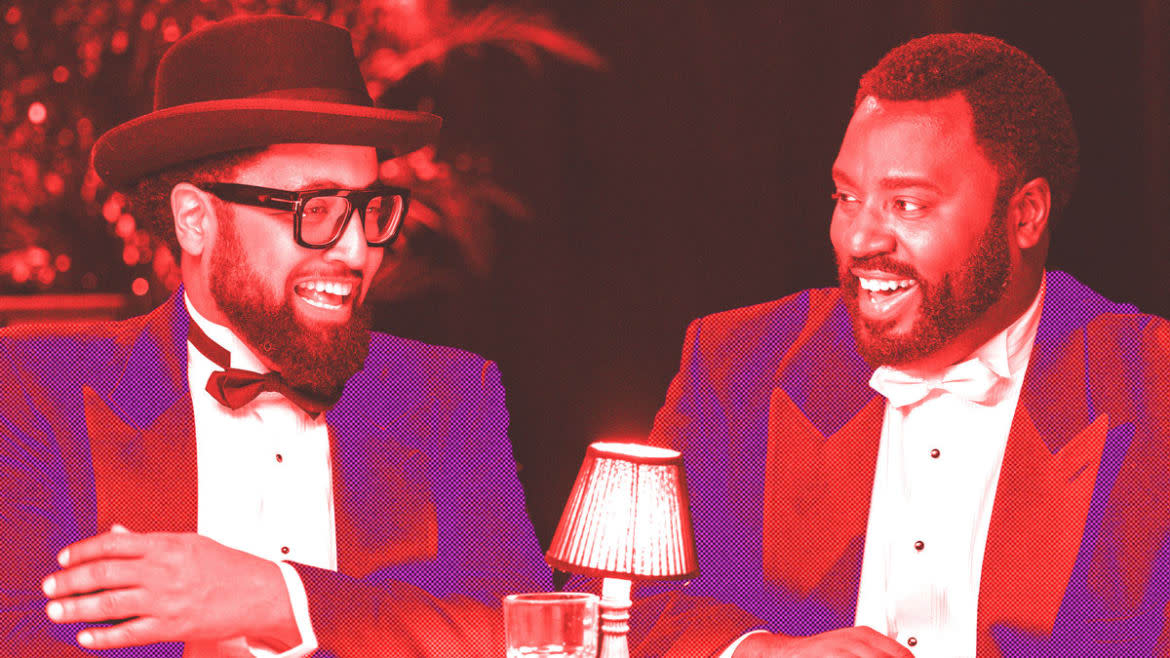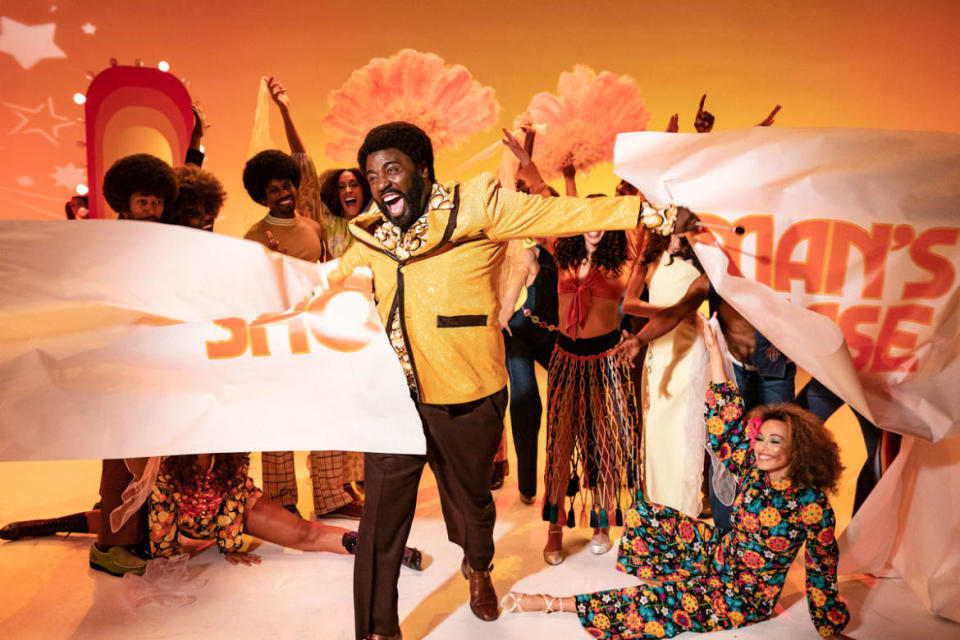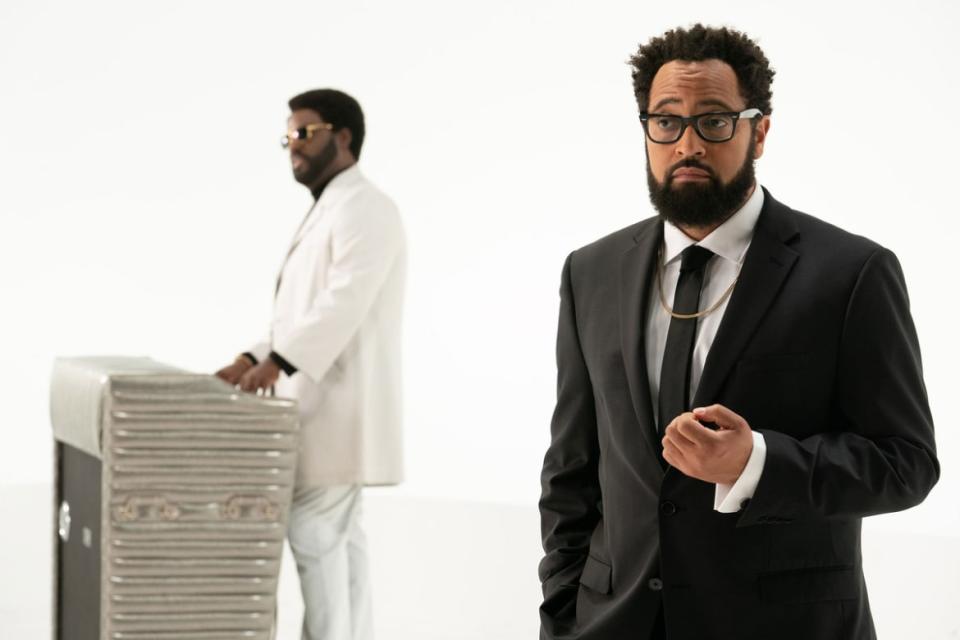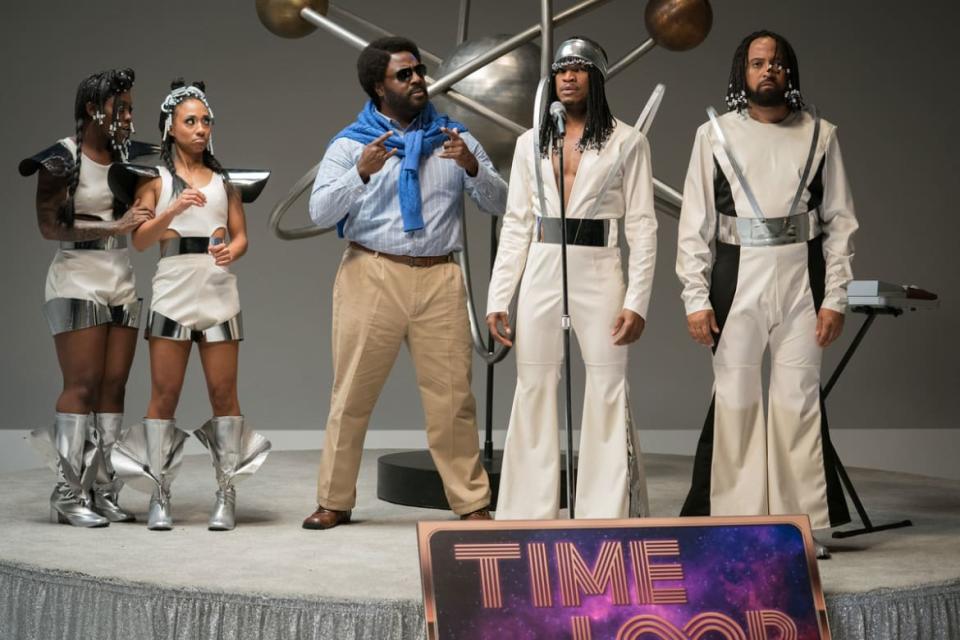‘Sherman’s Showcase’: TV’s Coolest Variety Show Makes Its Triumphant Return

- Oops!Something went wrong.Please try again later.
- Oops!Something went wrong.Please try again later.
- Oops!Something went wrong.Please try again later.
It’s hard to believe that it’s been three years since Sherman’s Showcase premiered. The IFC sketch comedy series debuted in the summer of 2019 with an eight-episode season full of original music, complex time-travel paradoxes, and a reminder that those Afro Sheen commercials starring Frederick Douglass actually happened. The following summer featured the Sherman’s Showcase “Black History Month Spectacular (in June)”—which introduced the world to the Ethiopian mob and proper dap etiquette—as well as an announcement that the series was renewed for a second season.
The second season of Sherman’s Showcase finally premieres tonight.
A sketch comedy riff on old-school dance variety shows like Solid Gold and Soul Train (which, in its fictional universe, Sherman’s Showcase claims was a copycat), the premise of Sherman’s Showcase is simple. It chronicles the 50 years (and counting) of the lost, but influential musical variety series, which was hosted by Sherman McDaniels (played by series co-creator Bashir Salahuddin) and produced by Dutch Shepherd (series co-creator Diallo Riddle).
The first season framed its episodes like paid programming—infomercials for a boxset of the series—showing highlights and hopping back and forth through the years of Sherman’s Showcase, showcasing Sherman’s failed entertainment enterprises and the evolution of musical stylings (through original songs created for the show) over the decades.

Musical acts include “Mary J. Blige” ala her fun, anti-”hateration” “Family Affair” era; Kenny Brown and the Wastebasket Band, a riff on go-go band E.U, who sang the song “Da Butt” from Spike Lee’s School Daze; Charade and the Mardi Gras, a Prince homage based on the opening lines of Prince’s “Computer Blue;” and the girl group RWKSY, responsible for what the show-within-the-show considered the most controversial performances in Sherman’s Showcase history, with “Drop it Low for Jesus” and the “Black History Month Spectacular” follow-up “Twerk the Other Cheek.”
Throughout the first season, various characters would attempt to showcase Sherman’s contribution to popular culture over the decades, from his support of women (featuring the aforementioned Blige number and “an unusual battle rap”) to his equal opportunity showcasing of white artists (like with his 12-song compilation album “Now That’s What I Call White Music,” featuring “all the white songs Black people fuck with”).
Sherman also truly fancied himself an authority on all things Black, providing the viewing audience with the “tragic story” of Montell Jordan (one of the many movies Sherman directed), his own all-Black debate show in “Brother You Wrong,” and his definitive list of the “Blackest Moments in Movie History” (including Terrence Howard’s contract negotiation for Iron Man 2—a sketch that’s one-part “mayne” and one-part “math”).
After a three-year wait for another full season of Sherman’s Showcase, this season is still packed with Easter Eggs, callbacks, deep-cut pop culture references, and pitch-perfect genre and style parodies. It’s also packed with new mythology to the strange, but familiar world in which the series exists.
“We want to start every single episode with something that makes people say, ‘Oh wow, what am I watching?,” Riddle tells The Daily Beast’s Obsessed. Which is why this season features even more clips of Sherman’s self-produced movies, TV shows, and commercials, on top of its original music and high-concept episode gimmicks (including Sherman’s attempt at doing his own version of Black Mirror’s “Bandersnatch”).
In other words, expect a new season in which the unexpected can always happen. Salahuddin and Riddle talked us through all the inspirations, challenges, and fun of making, let’s face it, TV’s most fun variety series. .
I can only really speak for myself as a big fan of the show, but I felt like I was kind of sitting in a desert waiting for water, in the form of any new Sherman's Showcase. What’s the production process like? Do you approach every season as though it could be the end?
Riddle: Our first manager in the business was Bernie Brillstein, a legend. He used to always joke that all of his clients thought every job they had was going to be their last, no matter how successful they were. And I think that that's definitely a feeling that Bashir and I have had in the past: We don't like to leave any ideas on the cutting-room floor, necessarily. We always think, “Oh man, if this is the end, we want to go out with the biggest bang.” So I think that's definitely the attitude we take to Sherman’s Season 2. And we try to give people like yourself who've been waiting in the desert, the biggest, tallest glass of fresh alkaline water that we can deliver.
We appreciate it.
Riddle: I'll say that it's also like preparing a second album, not just because Sherman's is so music-focused, but also because we're not necessarily following a narrative. The show is still essentially a sketch show. So when we come in, we are starting essentially from scratch. There were new areas we wanted to play in: new themes, new everything that we wanted to try to do to make it the best possible season, while also expanding the universe and meeting people's expectations.
At face value, it does seem like this season is looser. But you do notice— towards the end, especially—that things do connect. When you guys went into it, were you thinking, "We're going to do a looser narrative"?
Salahuddin: I don't think that was the thinking. I think we've built it exactly the same as the first season. Part of the process of any sketch comedy show is that you've got to be willing to walk through the wilderness a little bit, and be comfortable not knowing where you're going to land. With the first season, that Frederick Douglass thing was so funny, because it's actually a real thing from Soul Train, where Frederick Douglass would come out and do Afro commercials. And we were like, "That's hilarious." But then we did one, and we were like, "We want to keep doing this."
Give the people what they want.
Salahuddin: You do a thing one time, if you like it you go, "Hey, let's do that again." I think that was the approach, so it just turned out that we're going to do enough of these where now we have some connective tissue. I think Diallo's the one to kind of put it all together, and I think the new season was quite similar. We really started with just the very basic, "What's some funny things people want to do sketches about? What are some funny song ideas that we have not done yet?"
I do think the one bit of evolution you'd probably notice is that we just really don't like to repeat ourselves, ever. And so for us, it was perhaps less about altering the format and about leaning into the things we wanted to do, and also challenging ourselves to do new stuff. So, we found a different framing device, which wasn't there at the top of the season. I think it was just one of those situations where we started writing and slowly but surely, I think Diallo had an idea about, "Wait a second, what if it's like a Prestige thing?" And then we just were all like, "Oh, this show makes its own rules up as it goes." There's no orthodoxy we have to follow. If there’s a Season 3 and we decide the whole thing is a fever dream, we can do that.

What would you say are the musical numbers that people have responded to the most?
Riddle: Obviously “Drop It Low for Jesus” continues to win over TikTok, with all of its wonderfully respectful approach to both the church and twerking. When you look on Spotify, I'm sort of amazed at the songs that have gotten the most streaming. The house music remix of “Runnin’” has at times been second only to “Drop It Low for Jesus” as the most Spotify-streamed song that we've done—with Bashir loaning his Luther-esque vocals to “Runnin’.”
That’s amazing!
Riddle: I had a person who approached me recently when I was in New York doing press for this season who was like, "You're Diallo Riddle, right? ’Time Loop’ is my favorite song." He was like, "We still listen to it." I think that [fan-favorites range] from “Time Loop” to “Whoop De Kids,” which was our approach to dance hall, to “Add Some Kente”—which we could have never predicted would have the relevance it had when we recorded it. Suddenly we had Nancy Pelosi and the Democrats taking a knee, wearing kente cloth. 2020 was a weird time. I do feel like time and time again, the music and the comedy of Sherman's Showcase has been surprisingly predictive.
‘Documentary Now!’ Is Still One of the Wittiest Series on Television
What would you say is the most obscure reference in this season? Because I was reading an interview where you guys talked about how Questlove once asked you, "Was Dutch being out as producer a reference to Lorne Michaels being out at SNL?" What do you think is going to be the reference this season, where it's like, "Real ones know"?
Salahuddin: There's so many that I don't know which one will stand out. For me—it doesn't take a lot of intelligence for this—but one of my favorite, favorite jokes was from a sketch we did based on Dune. And I love that movie: I'm a big fan of Frank Herbert, and I like the original version. I [also] love the new Dune that just came out. Sci-fi is my jam. Of course, we have a sci-fi sketch in the show this season. But I love this joke we did, where Sherman is around the sandworms, and he goes, "Hey, we must be in Ohio, player. These some funky worms." And it's not that deep, but I love it. I love the song "Funky Worm." The fact that it's such a huge hip-hop sample too, I don't think people realize how many hip-hop songs have been sampled from it. So I think little stuff like that.
Riddle: Look, I think if you've been following pop culture, specifically Black culture, in the last 30 or 40 years, there are so many Easter Eggs for people. Let me say, there's almost nothing that gets past Questlove, so my attempts to always stump Questlove will probably be in vain this season, just like they've been in the past.
He always sniffs them out.
Riddle: I don't know how deep a cut this is, but we've been fans of Fela Kuti for a very long time. To do a Fela Kuti-style song is something that we've been trying to do from the very beginning. And I feel like this year we pulled that off, working with Phonte of Little Brother, who is sort of like the George Martin of Sherman's Showcase. Because anytime we go to him, we can get really deep into the music woods with him, and he will come back to us with something that sounds exactly like what we want to do.
There is a specificity that I think really adds to the flavor of the songs and continues in this season.
Riddle: Really, the music is where we have the most fun, because music can be an obscure reference. We were talking a lot about the Afro-Cuban and Puerto Rican sort of like... I didn't come up with this name: There's a genre, cocaine-salsa sound. And eventually working with one of our writers, Bashir and I came up with this song called “Audition Andres,” where Bashir plays this Afro-Latino singer, and I feel like we did a great job with that.

Salahuddin: I just want to add that I am Afro-Latino. It's me, and it's Zoe Saldana, and it's Miles Morales: That's it. And you have to love... Especially as an actor, I always feel bad for the Afro-Latino actors, because it's real inconsistent, but it was nice of me to touch that part of my own family history. My dad's side is all from Panama. So again, it's like there's things in there that are so personal, but ultimately whether it's personal or specific, we still have to present it in a way that's entertaining. And I think that's where the magic happens, because I think that song is really fun and festive.
It totally is. Thank you again for letting me pick your brain about the series.
Riddle: Hey look, we love talking about this show. One of our writers, Rob Haze, who plays Terrence Howard and he plays our weird riff on Barney the Dinosaur this season—and he's in a bunch of our stuff—he plays Little Baby in Atlanta Talk. He came to me with this idea that Questlove had long ago suggested, but we're actually going to do it in the week running up to the show, and in the weeks when the show's on the air. We're going to do this thing both on Instagram Live and on Twitter Spaces, where we reference the things that inspire various moments in this season. And I think that's actually sort of important, because that truly is where the show comes from. Bashir and I could be talking about our love of weird 1970s sci-fi, and come up with something like Dark Xenon.
We could be talking about our love of Christopher Nolan movies and end up talking about The Prestige. I think that Sherman's Showcase began as a conversation, where we were talking about, "You know, what songs did Rihanna pass on that were handed over to Ciara?" That's where a lot of these ideas come from. And I think that we want to continue that conversation online, because I think the show is funny on its own; but I think if you're having these conversations with us, which we want to do online, I think that you get an even more appreciation of what you get.
Get the Daily Beast's biggest scoops and scandals delivered right to your inbox. Sign up now.
Stay informed and gain unlimited access to the Daily Beast's unmatched reporting. Subscribe now.

